内蒙古包头市2016-2017学年高一英语上学期期末考试试题
内蒙古包头三十三中2016-2017学年高一语文下学期期末考试试题(含解析)

包头市三十三中2016-2017学年度第二学期期末考试高一年级语文本试卷分第一卷(阅读题)和第二卷(表达题)两部分,总分150分,时间150分钟。
第一卷(阅读题共75分)现代文阅读(一)社科类文本阅读(9分,每小题3分)阅读下面的文字,完成小题反腐,是古今中外都备受关注的话题,“老虎、苍蝇一起打”,大贪小贪均不放过。
一个国家的社会进步史,从某种意义上说,既是治官治吏史,也是反贪反腐史,古代各朝都成立相当于今天的反贪局或监察部这样的中央监察机构。
秦朝是中国历史上第一个建立完备监察机构的朝代,此机构名叫“御史台”,一把手叫“御史大夫”;汉代时,御史大夫被提升到与丞相同一行政级别。
汉文帝时,鉴于当时御史监察不力的情况,临时调派身边可信人员到下面核查,此行为称为“刺”。
汉武帝于公元前106年正式设立“刺史”,这成为中国古代反贪的一种新型“反腐办”。
除常规监察机构反腐外,古代还有最有效的一招,是动员民间参与反腐,鼓励民间积极“举报”。
刘彻建立所谓“言事变”制度,就是俗话所说的“打小报告”;南北朝的北魏拓跋嗣(魏明元帝)当皇帝时,专门下诏,鼓励民众举告贪官;到了北宋,“上奏言事”备受重视,范仲淹、包拯、王安石、朱熹,都曾给皇帝写过很多反腐奏折,《包孝肃公奏议》一书多是揭露、举报官员腐败的,当时的贪官最怕被包拯奏上一本;明朝开国皇帝朱元璋除了允许越级告状、鼓励实名举报外,还支持民间进京上访。
“举报”虽然可以减少官员腐败现象,但腐败仍无法从根本上杜绝。
于是,“制度反腐”成为一种探索。
所谓“制度反腐”,古人叫“治贪用重典”,在《吕刑》中便有“其罪惟均”的说法,即官员贪赃枉法,与庶民同罪。
从量刑上看,对官吏犯罪的法律惩罚重于常人。
在秦朝,“通一钱者,黥为城旦”,即行贿受贿达到一个铜钱,就要受到脸上刺字并服苦役的刑罚。
明朝对贪官用刑之酷是历史上罕见的,尤其让人感到恐怖的是“剥皮实草”,贪官污吏们被拉到府州县衙门左首的土地庙杀死,并将他们的皮整张剥下来,里面填上稻草,然后把这些假人摆在衙门的公座旁边,以这种阴森恐怖的方式与继任官员进行职务的移交。
内蒙古包头市第一中学2016-2017学年高一上学期期末考试英语试题含答案

包头一中2016-2017学年度第一学期期末考试高一年级英语试题第I卷命题人:陶丽萍审题人:李清庆第一部分听力(共两节,满分30分)第一节(共5小题;每小题1.5分,满分7.5分)听下面5段对话,完成1—5题.每小题仅读一遍。
1。
What is the girl using?A。
A washing machine. B。
An ATM。
C. A computer。
2。
What are they going to do?A.Watch TV. B。
Go swimming. C。
Play volleyball。
3. Who is the man probably?A. A taxi driver. B。
A hotel manager。
C. An airport worker.4. What’s the weather like now?A.Windy。
B. Dry.C. Rainy。
5。
What's wrong with the man?A。
He has a headache. B。
He has a stomachache。
C。
He has a toothache.第二节(共15小题;每小题1.5分,满分22。
5分)听下面五段对话或独白,每段对话或独白后有几个小题,每段独白读两遍。
听第6段材料,回答第6、7题。
6. How often does the woman do such a report?A。
Once a day。
B. Once a week. C。
Oncea month。
7. Where are they going?A. To a gym。
B. To a museum。
C. To a park.听第7段材料,回答第8、9题。
8. Where does the man advise the woman to go?A。
To the Louvre Museum。
B。
To the Eiffel Tower. C。
内蒙古包头市第一中学2020-2021学年高一上学期期中英语试题(解析版)

包头一中2020——2021学年度第一学期期中考试高一年级英语试题第I卷第一部分听力(共两节,满分30分)第一节(共5小题:每小题1.5分,满分7.5分)听下面5段对话。
每段对话后有一个小题,从题中所给的A、B、C三个选项中选出最佳选项,并标在试卷的相应位置。
听完每段对话后,你都有10秒钟的时间来回答有关小题和阅读下一小题。
每段对话仅读一遍。
1. What does the man like doing?A. Listening to music.B. Doing some reading.C. Going to the movies.2. What will the woman do next Friday?A. Have a holiday.B. Fly to Mexico with the man.C. Have dinner in the man’s house.3. What is the woman doing?A. Offering some sugar.B. Drinking some coffee.C. Asking for some milk.4. What is the probable relationship between the speakers?A. Teacher and student.B. Brother and sister.C. Classmates.5. Why was the man late?A. He got caught in the traffic.B. His alarm clock didn’t work.C. His car broke down on the way.第二节(共15小题,每小题1.5分,满分22.5分)请听下面5段对话或独白,选出最佳选项。
听第6段材料,回答第6、7题。
6. What does the woman do?A. A teacher.B. A doctor.C. A nurse.7. Which city will the man visit next week?A. ShanghaiB. Beijing.C. Harbin.听第7段材料,回答第8,9题。
2021-2022学年内蒙古包头市高一下学期期末考试英语试题
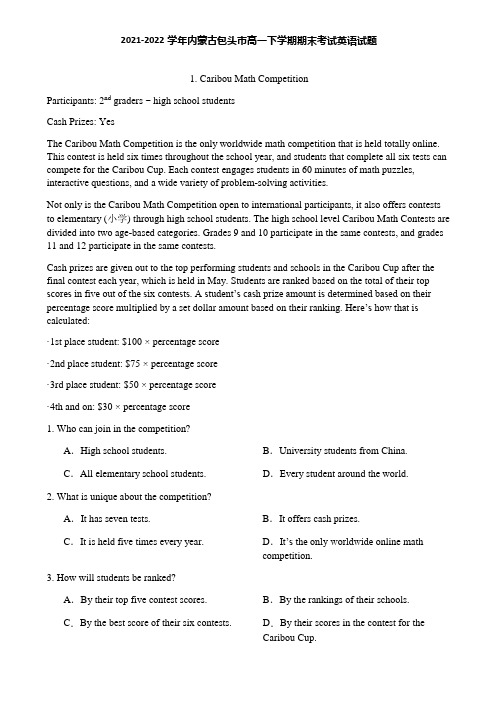
2021-2022学年内蒙古包头市高一下学期期末考试英语试题1. Caribou Math CompetitionParticipants: 2nd graders ~ high school studentsCash Prizes: YesThe Caribou Math Competition is the only worldwide math competition that is held totally online. This contest is held six times throughout the school year, and students that complete all six tests can compete for the Caribou Cup. Each contest engages students in 60 minutes of math puzzles, interactive questions, and a wide variety of problem-solving activities.Not only is the Caribou Math Competition open to international participants, it also offers contests to elementary (小学) through high school students. The high school level Caribou Math Contests are divided into two age-based categories. Grades 9 and 10 participate in the same contests, and grades 11 and 12 participate in the same contests.Cash prizes are given out to the top performing students and schools in the Caribou Cup after the final contest each year, which is held in May. Students are ranked based on the total of their top scores in five out of the six contests. A student’s cash prize amount is determined based on their percentage score multiplied by a set dollar amount based on their ranking. Her e’s how that is calculated:·1st place student: $100 × percentage score·2nd place student: $75 × percentage score·3rd place student: $50 × percentage score·4th and on: $30 × percentage score1. Who can join in the competition?A.High school students. B.University students from China.C.All elementary school students. D.Every student around the world.2. What is unique about the competition?A.It has seven tests. B.It offers cash prizes.C.It is held five times every year. D.It’s the only worldwide online mathcompetition.3. How will students be ranked?A.By their top five contest scores. B.By the rankings of their schools.C.By the best score of their six contests. D.By their scores in the contest for theCaribou Cup.2. Do you remember the nam e of your kindergarten teacher? I do. Her name was Mrs. White. I don’t remember much about what we learned in her class, but my mother once told me we used to write a lot. And I would bring back what I wrote and she would see there were so many mistakes. But no red corrections. And always a star. Sometimes even a Good! That would make my heart soar with happiness. But it worried my mother, so when she went to meet Mrs. White for one of those Parent-Teacher meetings, she asked her why she never corrected my mistakes, why she never red-pencilled in the right spellings of words or pointed out grammatical errors.Mrs. White explained the children were just beginning to get excited about using words, about forming sentences. She didn’t want to dampen that enthusi asm with red ink. Spelling and grammar could wait. The wonder of words wouldn’t ... And maybe she didn’t say it exactly like that, but I grew up learning to use words with loving confidence like that.I look back now and think she must have been a rather extraordinary teacher—to allow the joy, wonder and excitement of expression to flower—however faultily like that.I used to misspell “beautiful” a lot. Never could I quite remember that the “e” went before the “a”. Eventually the e’s and a’s settled into their right places of their own accord. I’m glad I didn’t wait on them though. Pretty is easier to spell but it doesn’t hold as much as you mean sometimes.And thanks to Mrs. White, I had no qualms about writing what I meant even if I couldn’t quite spell it out. Because Life isn’t Pretty. It’s Beautiful.1. How did the mother react to Mrs. White’s teaching method?A.She paid no attention. B.She tried to correct it.C.She quarreled with her. D.She went to consult her.2. Why did the teacher never correct the mistakes?A.She wanted parents to help the students.B.She thought it was difficult to correct them.C.She hoped to develop students’ confidence.D.She wanted to strengthen teacher-student relationship.3. What does the underlined word “qualm” in t he last paragraph refer to?A.Relaxation B.ConcernC.Patience D.Ambition.4. What is the best title for the text?A.Life Is Beautiful B.No Pains, No GainsC.Practice Makes Perfect D.Spelling Is Important3. Social distancing, as smart as it maybe to stop COVID-19 spreading, has cost us a lot during the past year. Luckily, we’re resilient (能复原的). It’s time, finally, for a great, big hug.“Hugs area really powerful way of reminding people that they’re cared about,” says professor Michael Murphy at Texas Tech University. “When we’re born, we’re placed in our mother’s arms almost immediately. In that first year of our life, we spend a lot of time being held by other people. And as we grow up, we seek out hugs and touches as a way of connection. I think what has been lost in this past year are these really easy opportunities to be reminded of connection.”Murphy was the lead author of a hug-centered 2018 article. In a series of interviews with adults, the researchers found that receiving a hug is connected with the reduction of negative mood that occurs on days with interpersonal conflict (冲突).Other papers have found similarly that hugs aren’t just reserved for simple social greetings. Hugs and other forms of physical touch can change a person’s moods and of fer emotional support. A 2006 study showed that simply holding hands with each other helped calm the brain’s reactions to the possible threat.Researchers still have plenty of questions about how hugs work: Are all hugs alike? How do different cultures around the worldview the worth of hugging? The answers may not be clear yet. But for now, it’s time to get back to a good hug. “There are many people who have been fully vaccinated (接种疫苗的). They are enjoying their hugs with their friends and family members who are also vaccinated,” Murphy says. “I think there’s a lot of thirst there.”1. What could physical touch serve as in the 2006 study?A.Negative reactions. B.Social greetings.C.Emotional support. D.Potential threat.2. What do the papers and research mentioned in the text try to show?A.Our strong wish for hugging. B.The power of hugging and touch.C.Our physical reactions to hugging. D.The different forms of physical touch.3. What can we know from the passage?A.All hugs are alike. B.Hugs can hardly change a person’s moods.C.All the citizens have been fully vaccinated. D.Researchers are still uncertain about how hugs work.4. Which of the following would Murphy agree with?A.Hugs are the most common form of touch.B.Hugs cannot be stopped by social distancing.C.Hugs can reduce negative influences of personal conflicts.D.Hugs are of greater importance to children than to adults.4. New research shows that people with blue eyes have a single, common ancestor. A team at University of Copenhagen tracked down a genetic mutation (基因突变) which took place 6,000 to 10,000 years ago and is the cause of the eye colour of all blue-eyed humans alive on the planet today.“Originally, we all had brown eyes,” said Professor Hans Eiberg. “But a genetic mutatio n affecting the OCA2 gene (基因) in our body resulted in the creation of a switch, which could turn off the ability to produce brown eyes.” The OCA2 gene codes for the so-called P protein, which is involved in the production of melanin (黑色素). It gives colour to our hair, eyes and skin.The switch does not, however, turn off the gene entirely, but rather limits its action to reducing the production of melanin in the eyeball—effectively turning brown eyes to blue. The effect of the switch on OCA2 is very specific therefore. If the OCA2 gene had been completely destroyed or turned off, human beings would be without melanin in their hair, eyes or skin colour.Change in the colour of the eyes from brown to green can all be explained by the amount of melanin in the eyeball, but blue-eyed individuals only have a small degree of change in the amount of melanin in their eyes. “From this we can conclude that all blue-eyed individuals are linked to the same ancestor,” said Professor Eiberg. “They have all inherited (继承) the same switch at exactly the same spot in their DNA.” Brown eyed individuals, by contrast, have considerable individual change in the area of their DNA that controls melanin production.The mutation of brown eyes to blue represents neither a positive nor a negative mutation. It is one of several mutations such as hair colour, baldness, and beauty spots, which neither increases nor reduces a human’s chance of survival. As Professor Eiberg says, “It simply shows that nature is constantly affecting the human gene and tying out different changes as it does so.”1. What is the finding of Professor Hans Eiberg’s team?A.The eye color can be changed by adjusing genes today.B.Blue-eyed people have survived due to their special genes.C.A genetic mutation leads t o the change of people’s eye color.D.The eye color can help discover where people’s ancestors were.2. What can we learn about “the switch” from Paragraph 3?A.It produces melanin directly. B.It helps produce less melanin.C.It can be limited by other genes. D.It helps OCA2 function in our body.3. Why can we conclude all blue-eyed individuals are linked to the same ancestor?A.They have more change in gene. B.They have exactly the same gene.C.They have more melanin in their eyes. D.They have little change in the amount ofmelanin.4. What does the last paragraph want to tell us?A.Nature affects our genes. B.Only the fittest can survive.C.We are decided by our genes. D.Some genetic mutations are meaningless.5. Each year, the US Social Security Administration releases a list of the most popular baby namesof the year. Nearly every citizen is registered (登记) with the organization, making it easy to create an accurate list.1 For example, names such as Dorothy (for girls) and Walter (for boys) were popular in the 1910s. But these days, these names are considered to be old-fashioned.2 Other examples of old-fashioned names include Gladys and Ethel (for girls) and Howard and Clarence (for boys).The list also shows which names are most common during a certain decade. 3 It happens to be my name.But some more unusual names have increased in popularity in recent years. From 2016 to 2017, the names “Wells” and “Kairo” (for boys) and “Ensley” and “Oaklynn” (for girls) all became more popular. But these names are still quite rare compared to more ordinary names.4 For example, the name “Isabella” saw a huge jump in popularity in 2009. This was because of the success of the Twilight film series, in which one of the main characters is named Isabella. 56. People often fall ill because of me. _________, they can hardly blame me; it is largely their own _________. A tired person may get _________, especially when he goes to crowded places with polluted air. A sudden change in _________ is another factor. In hot summer, people turn on the air-conditioner upon returning home. They will catch a cold easily.My latest victim is an energetic student. After school, he played football hard for two hours. Though _________, he still went to the cinema. Then he got back home and took a cold shower immediately.I seized this golden chance to _________ him. He reacted, trying to _________ me, but I was already multiplying deep in his throat. He kept sneezing (打喷嚏) and his nose was running._________ he put on some warm clothes, it didn’t work, for there were too _________ of us. Besides, his sore throat kept __________ him, and he developed a cough to force me and my family out, but __________.The next day he couldn’t go to __________. He had lost his appetite and was not as __________ as before. His mother made him orange juice every few hours for more vitamin C, which would helphis __________. For two days he was __________ by his mother. As he rested more, his defense strengthened and I began to feel the __________. I knew I had to __________ him before long. But I am not the one who gives up easily, and I made every effort to fight back. __________, it was my turn to feel __________ now, for his defense system was staring an all-out attack against me. I became __________ and finally my time was over.Do you know what I am?1.A.Therefore B.Besides C.However D.Then2.A.business B.kind C.excuse D. fault3.A.punished B.blamed C.caught D. killed4.A.temperature B.age C.place D.condition5.A.excited B.hurt C.late D.exhausted6.A.injure B.bother C.attack D.destroy7.A.get on with B.get rid of C.put up with D.take hold of 8.A.Since B.Once C.Whether D.Although9.A.many B.little C.wide D.thick10.A.reminding B.upsetting C.comforting D.influencing 11.A.escaped B.succeeded C.regretted D.failed12.A.bed B.work C.school D.hospital13.A.peaceful B.afraid C.active D.happy14.A.recovery B.development C.study D.suffering15.A.protected B.nursed C.scolded D.affected16.A.loss B.operation C.pressure D.movement17.A.leave B.catch C.forget D.beat18.A.Uncertainly B.Unfairly C.Unusually D.Unfortunately19.A.painful B.bored C.nervous D.ashamed20.A.bigger B.weaker C.smaller D.stronger7. 阅读下面短文,在空白处填入1个适当的单词或括号内单词的正确形式。
精选内蒙古包头市第一中学2016_2017学年高二语文上学期期中试题
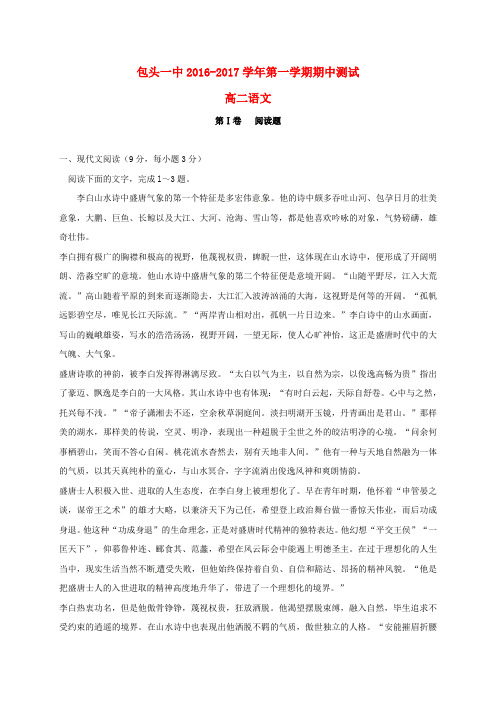
包头一中2016-2017学年第一学期期中测试高二语文第Ⅰ卷阅读题一、现代文阅读(9分,每小题3分)阅读下面的文字,完成l~3题。
李白山水诗中盛唐气象的第一个特征是多宏伟意象。
他的诗中颇多吞吐山河、包孕日月的壮美意象,大鹏、巨鱼、长鲸以及大江、大河、沧海、雪山等,都是他喜欢吟咏的对象,气势磅礴,雄奇壮伟。
李白拥有极广的胸襟和极高的视野,他蔑视权贵,睥睨一世,这体现在山水诗中,便形成了开阔明朗、浩淼空旷的意境。
他山水诗中盛唐气象的第二个特征便是意境开阔。
“山随平野尽,江入大荒流。
”高山随着平原的到来而逐渐隐去,大江汇入波涛汹涌的大海,这视野是何等的开阔。
“孤帆远影碧空尽,唯见长江天际流。
”“两岸青山相对出,孤帆一片日边来。
”李白诗中的山水画面,写山的巍峨雄姿,写水的浩浩汤汤,视野开阔,一望无际,使人心旷神怡,这正是盛唐时代中的大气魄、大气象。
盛唐诗歌的神韵,被李白发挥得淋漓尽致。
“太白以气为主,以自然为宗,以俊逸高畅为贵”指出了豪迈、飘逸是李白的一大风格。
其山水诗中也有体现:“有时白云起,天际自舒卷。
心中与之然,托兴每不浅。
”“帝子潇湘去不还,空余秋草洞庭间。
淡扫明湖开玉镜,丹青画出是君山。
”那样美的湖水,那样美的传说,空灵、明净,表现出一种超脱于尘世之外的皎洁明净的心境。
“问余何事栖碧山,笑而不答心自闲。
桃花流水杳然去,别有天地非人间。
”他有一种与天地自然融为一体的气质,以其天真纯朴的童心,与山水冥合,字字流淌出俊逸风神和爽朗情韵。
盛唐士人积极入世、进取的人生态度,在李白身上被理想化了。
早在青年时期,他怀着“申管晏之谈,谋帝王之术”的雄才大略,以兼济天下为己任,希望登上政治舞台做一番惊天伟业,而后功成身退。
他这种“功成身退”的生命理念,正是对盛唐时代精神的独特表达。
他幻想“平交王侯”“一匡天下”,仰慕鲁仲连、郦食其、范蠡,希望在风云际会中能遏上明德圣主。
在过于理想化的人生当中,现实生活当然不断遭受失败,但他始终保持着自负、自信和豁达、昂扬的精神风貌。
高二英语上学期期末考试试题(附答案)
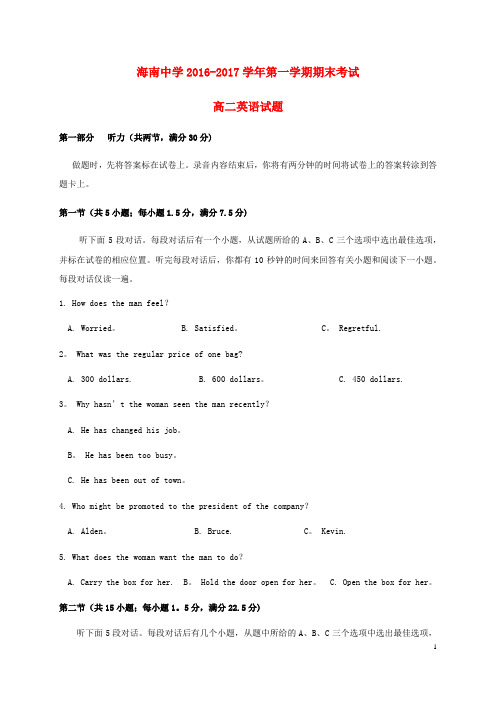
海南中学2016-2017学年第一学期期末考试高二英语试题第一部分听力(共两节,满分30分)做题时,先将答案标在试卷上。
录音内容结束后,你将有两分钟的时间将试卷上的答案转涂到答题卡上。
第一节(共5小题;每小题1.5分,满分7.5分)听下面5段对话。
每段对话后有一个小题,从试题所给的A、B、C三个选项中选出最佳选项,并标在试卷的相应位置。
听完每段对话后,你都有10秒钟的时间来回答有关小题和阅读下一小题。
每段对话仅读一遍。
1. How does the man feel?A. Worried。
B. Satisfied。
C。
Regretful.2。
What was the regular price of one bag?A. 300 dollars.B. 600 dollars。
C. 450 dollars.3。
Why hasn’t the woman seen the man recently?A. He has changed his job。
B。
He has been too busy。
C. He has been out of town。
4. Who might be promoted to the president of the company?A. Alden。
B. Bruce. C。
Kevin.5. What does the woman want the man to do?A. Carry the box for her. B。
Hold the door open for her。
C. Open the box for her。
第二节(共15小题;每小题1。
5分,满分22.5分)听下面5段对话。
每段对话后有几个小题,从题中所给的A、B、C三个选项中选出最佳选项,并标在试卷的相应位置。
听每段对话前,你将有时间阅读各个小题,每小题5秒钟;听完后,各小题将给出5秒钟的作答时间。
2016-2017学年度第一学期期末考试九年级英语试题---精品管理资料
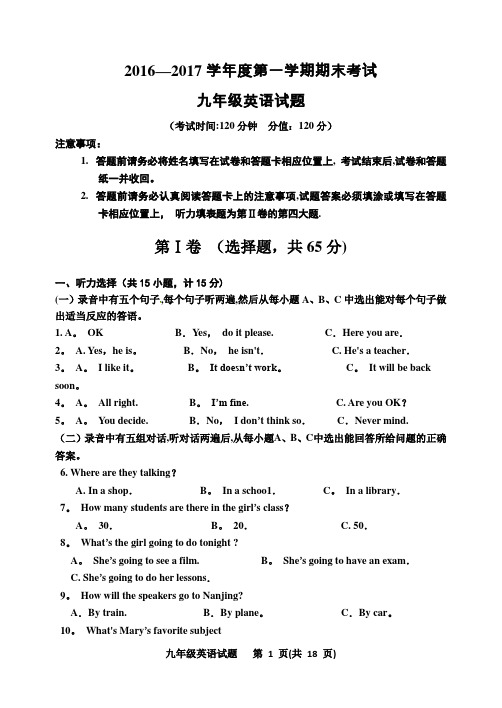
2016—2017学年度第一学期期末考试九年级英语试题(考试时间:120分钟分值:120分)注意事项:1.答题前请务必将姓名填写在试卷和答题卡相应位置上, 考试结束后,试卷和答题纸一并收回。
2.答题前请务必认真阅读答题卡上的注意事项,试题答案必须填涂或填写在答题卡相应位置上,听力填表题为第Ⅱ卷的第四大题.第Ⅰ卷(选择题,共65分)一、听力选择(共15小题,计15分)(一)录音中有五个句子,每个句子听两遍,然后从每小题A、B、C中选出能对每个句子做出适当反应的答语。
1. A。
OK B.Y es,do it please. C.Here you are.2。
A. Yes,he is。
B.No,he isn't. C. He's a teacher.3。
A。
I like it。
B。
It doesn’t work。
C。
It will be back soon。
4。
A。
All right. B。
I’m fine. C. Are you OK?5。
A。
You decide. B.No,I don’t think so.C.Never mind.(二)录音中有五组对话,听对话两遍后,从每小题A、B、C中选出能回答所给问题的正确答案。
6. Where are they talking?A. In a shop.B。
In a schoo1.C。
In a library.7。
How many students are there in the girl’s class?A。
30.B。
20. C. 50.8。
What’s the girl going to do tonight ?A。
She’s going to see a film. B。
She’s going to have an exam.C. She’s going to do her lessons.9。
How will the speakers go to Nanjing?A.By train. B.By plane。
湖北省宜昌市协作体2024-2025学年高一上学期期中考试英语试题(含答案,无听力音频无听力原文)
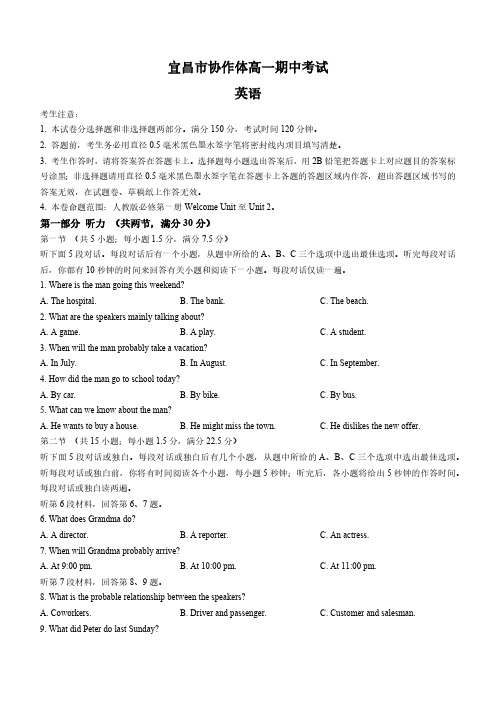
宜昌市协作体高一期中考试英语考生注意:1. 本试卷分选择题和非选择题两部分。
满分150分,考试时间120分钟。
2. 答题前,考生务必用直径0.5毫米黑色墨水签字笔将密封线内项目填写清楚。
3. 考生作答时,请将答案答在答题卡上。
选择题每小题选出答案后,用2B铅笔把答题卡上对应题目的答案标号涂黑;非选择题请用直径0.5毫米黑色墨水签字笔在答题卡上各题的答题区域内作答,超出答题区域书写的答案无效,在试题卷、草稿纸上作答无效。
4. 本卷命题范围:人教版必修第一册Welcome Unit至Unit 2。
第一部分听力(共两节,满分30分)第一节(共5小题;每小题1.5分,满分7.5分)听下面5段对话。
每段对话后有一个小题,从题中所给的A、B、C三个选项中选出最佳选项。
听完每段对话后,你都有10秒钟的时间来回答有关小题和阅读下一小题。
每段对话仅读一遍。
1. Where is the man going this weekend?A. The hospital.B. The bank.C. The beach.2. What are the speakers mainly talking about?A. A game.B. A play.C. A student.3. When will the man probably take a vacation?A. In July.B. In August.C. In September.4. How did the man go to school today?A. By car.B. By bike.C. By bus.5. What can we know about the man?A. He wants to buy a house.B. He might miss the town.C. He dislikes the new offer.第二节(共15小题;每小题1.5分,满分22.5分)听下面5段对话或独白。
- 1、下载文档前请自行甄别文档内容的完整性,平台不提供额外的编辑、内容补充、找答案等附加服务。
- 2、"仅部分预览"的文档,不可在线预览部分如存在完整性等问题,可反馈申请退款(可完整预览的文档不适用该条件!)。
- 3、如文档侵犯您的权益,请联系客服反馈,我们会尽快为您处理(人工客服工作时间:9:00-18:30)。
内蒙古包头市2016-2017学年高一英语上学期期末考试试题第Ⅰ卷
第一部分:英语听力(共15小题;每小题1.5分,满分30分)
第一节(共5小题,每题1.5分,满分7.5分)
请听下面5段对话,选出最佳选项。
1. When should the man finish his school paper?
A. Next Wednesday
B. Next Thursday
C. Next Friday
2. Where does the man probably come from?
A. Russia
B. Britain
C. China
3.What does the woman order?
A. Fish
B. Beef
C. Chicken
4. How does the woman usually go to work?
A. By bus
B. By car
C. On foot
5. When will the tennis match take place?
A. On July 10th
B. On July 13th
C. On July 14th
第二节(共15小题,每题1.5分,满分22.5分)
请听下面5段对话或独白,选出最佳选项。
请听第6段材料,回答第6至7题。
6.How soon will the woman be in the office?
A. In half an hour.
B. In an hour.
C. In one and a half hours
7. What will the woman probably do?
A. Get paper and ink
B. Sign an agreement
C. Fix the printer
请听第7段材料,回答第8至9题。
8.What relation is Tim to Tom?
A. His father
B. His friend
C. His brother
9. What did Tom actually do last Friday night?
A. He gave a performance.
B. He watched a movie
C. He went out shopping.
请听第8段材料,回答第10至12题。
10.How much did the man weigh when he visited the woman last time?
A. 185 pounds.
B. 180 pounds
C. 175 pounds
11.What does the man usually have on the way home in the afternoon?
A. An ice cream.
B. A yogurt
C. A Coke
12. What does the man spend most of his time doing?
A. Taking exercise.
B. Doing homework
C. Watching TV
请听第9段材料,回答第13至16题。
13.What does the woman have to do on Thursday?
A. Have an evening class.
B. Look after her daughter.
C. Teach small children drama.
14.When will the woman meet the man on Wednesday?
A. At 6:00
B. At 6:30
C. At 7:00
15. How old is the man’s son now?
A. Three years old.
B. Five years old.
C. Six years old.
16. What does the woman need to do?
A. Share the bathroom with the owner.
B. Take the kids to school.
C. Work every night.
请听第10段材料,回答第17至20题。
17.Which of the following doesn’t Roberta need to buy?
A. Sugar.
B. Milk
C. Coffee
18. Where does Sarah Hunt probably work?
A. At a gym.
B. At a school
C. At a supermarket
19. What has Roberta been waiting for?
A. A postcard from her mother.
B. A letter from her daughter.
C. A reply from a conference.
20.Who likes football?
A. Roberta.
B. Francisco.
C. Sarah..
第二部分:阅读理解(共两节,满分40分)
第一节(共15小题; 每小题2分, 满分30分)
阅读下列短文,从每题所给的四个选项中,选出最佳选项,并在答题卡上将该项涂黑.
A
I have a neighb or we call “Happy”. I have never seen her angry at anything and never
heard her say a harsh (苛刻) word to any one or about anyone.
Happy and her husband Ben, 70, have a huge garden. They spent many happy hours together working on it. Most of the neighbors watched interestingly as Ben doubled the size of their garden. As the cost of food climbed faster than Ben’s beans, we all wished we also had
such a large garden. As the rest of us spent our dollars at the market, Happy could be seen
picking beans in her back yard.
Last month, Happy and Ben invited most of the neighborhood over for an “all-day
food fest”. We were told to bring gloves and arrive very early in the morning. We didn’t
know what was about to take place.
By 9:00 am, there were nine of us in the garden picking tomatoes, beans, okra, and squash. By 10:00 am, there was lots of laughter. We shared a lot of stories. By five o’cloc k, everyone was a little drunk from the wine and beer. After dinner, we played games. As we
were leaving, Happy and Ben handed each of us a shopping bag filled with the bounty(收
成)of the day, already packaged and frozen. What a delightful gift!
Well, t he point wasn’t so much about the food. The true gift was a day of friends enjoying one another’s company. None of it would have happened if it had not been for Happy
and Ben’s garden. Now they have a blog about gardening in case we decided to plant a gard en.
And I am so proud of my tomato plants!
21. We can infer that Happy and her husband Ben_______.
A. don’t like spending time with others
B. sometimes
quarrel with each other
C. live on the food they grow in their garden
D. are a generous and
warm-hearted couple。
